MN4062 Portfolio Part 2: Teamwork, Motivation, and CVF Analysis
VerifiedAdded on 2022/12/29
|9
|2101
|66
Report
AI Summary
This portfolio report, submitted for the MN4062 Fundamentals of Management course, provides a detailed reflection on a group project, analyzing teamwork dynamics and individual performance. The report begins with an introduction outlining the importance of reflective practices and effective teamwork in achieving common goals. The main body delves into the application of teamwork theories, specifically Tuckman's stages of group development (Forming, Storming, Norming, Performing, and Adjourning), to assess the group's progress and individual contributions. The report then explores motivational theories, particularly Maslow's hierarchy of needs, to understand the factors influencing individual motivation and performance within the team. Furthermore, the report utilizes the Competing Values Framework (CVF) to evaluate personal competencies and action imperatives. The conclusion summarizes the key findings, emphasizing the significance of teamwork, motivation, and self-assessment in enhancing individual and team performance. The report is supported by references to relevant academic literature.

MN4062 - Portfolio part 2
Paraphrase This Document
Need a fresh take? Get an instant paraphrase of this document with our AI Paraphraser
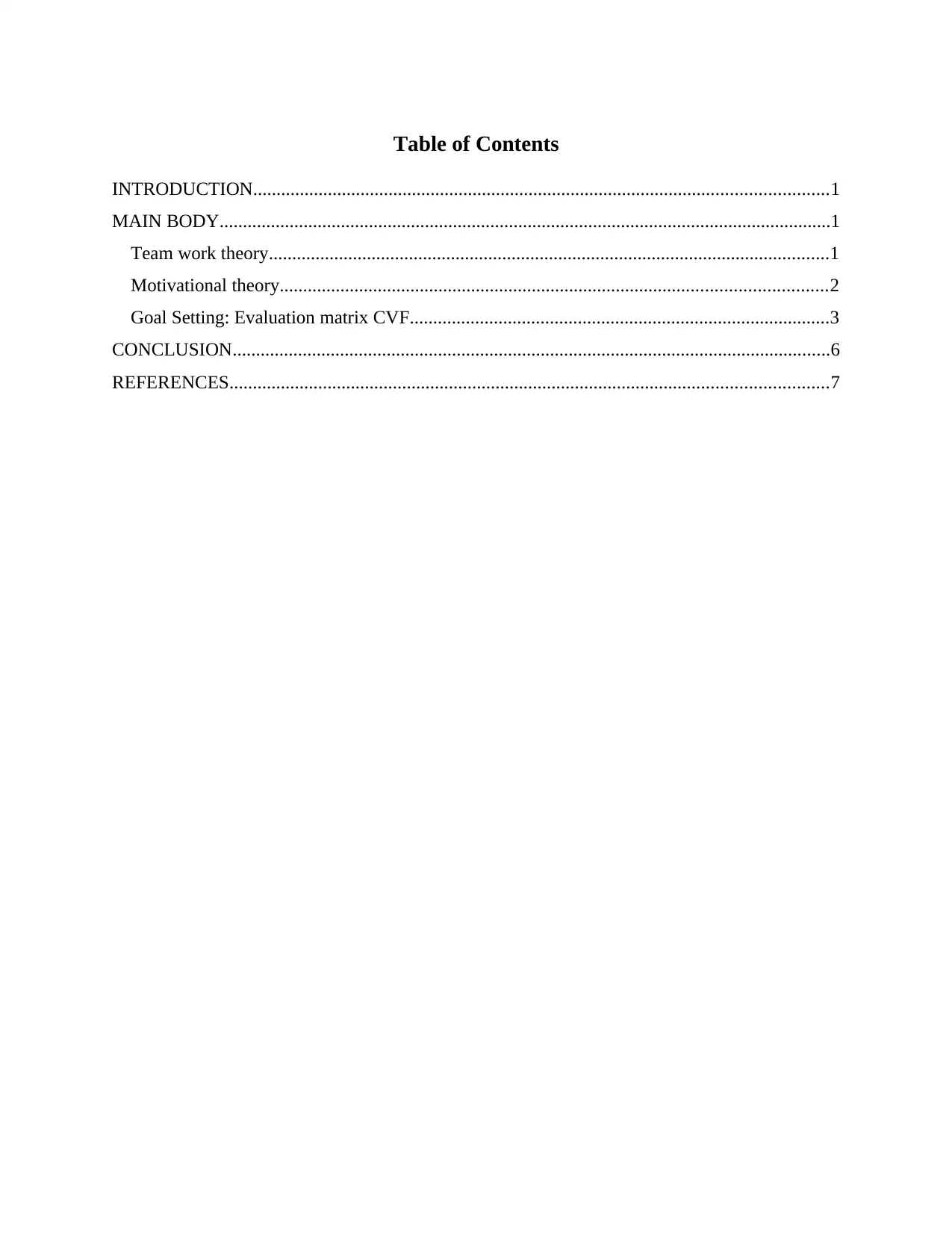
Table of Contents
INTRODUCTION...........................................................................................................................1
MAIN BODY...................................................................................................................................1
Team work theory........................................................................................................................1
Motivational theory.....................................................................................................................2
Goal Setting: Evaluation matrix CVF..........................................................................................3
CONCLUSION................................................................................................................................6
REFERENCES................................................................................................................................7
INTRODUCTION...........................................................................................................................1
MAIN BODY...................................................................................................................................1
Team work theory........................................................................................................................1
Motivational theory.....................................................................................................................2
Goal Setting: Evaluation matrix CVF..........................................................................................3
CONCLUSION................................................................................................................................6
REFERENCES................................................................................................................................7
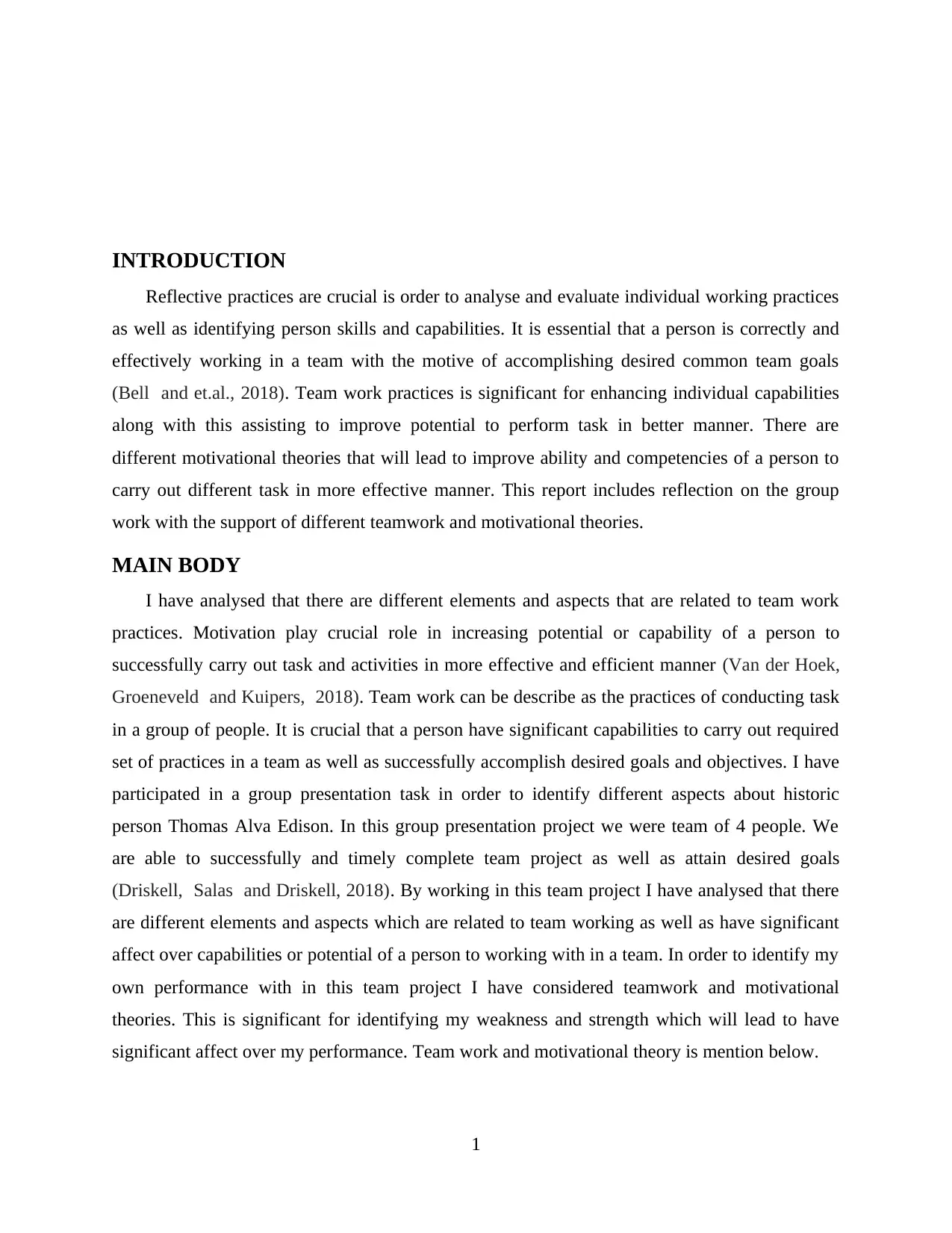
INTRODUCTION
Reflective practices are crucial is order to analyse and evaluate individual working practices
as well as identifying person skills and capabilities. It is essential that a person is correctly and
effectively working in a team with the motive of accomplishing desired common team goals
(Bell and et.al., 2018). Team work practices is significant for enhancing individual capabilities
along with this assisting to improve potential to perform task in better manner. There are
different motivational theories that will lead to improve ability and competencies of a person to
carry out different task in more effective manner. This report includes reflection on the group
work with the support of different teamwork and motivational theories.
MAIN BODY
I have analysed that there are different elements and aspects that are related to team work
practices. Motivation play crucial role in increasing potential or capability of a person to
successfully carry out task and activities in more effective and efficient manner (Van der Hoek,
Groeneveld and Kuipers, 2018). Team work can be describe as the practices of conducting task
in a group of people. It is crucial that a person have significant capabilities to carry out required
set of practices in a team as well as successfully accomplish desired goals and objectives. I have
participated in a group presentation task in order to identify different aspects about historic
person Thomas Alva Edison. In this group presentation project we were team of 4 people. We
are able to successfully and timely complete team project as well as attain desired goals
(Driskell, Salas and Driskell, 2018). By working in this team project I have analysed that there
are different elements and aspects which are related to team working as well as have significant
affect over capabilities or potential of a person to working with in a team. In order to identify my
own performance with in this team project I have considered teamwork and motivational
theories. This is significant for identifying my weakness and strength which will lead to have
significant affect over my performance. Team work and motivational theory is mention below.
1
Reflective practices are crucial is order to analyse and evaluate individual working practices
as well as identifying person skills and capabilities. It is essential that a person is correctly and
effectively working in a team with the motive of accomplishing desired common team goals
(Bell and et.al., 2018). Team work practices is significant for enhancing individual capabilities
along with this assisting to improve potential to perform task in better manner. There are
different motivational theories that will lead to improve ability and competencies of a person to
carry out different task in more effective manner. This report includes reflection on the group
work with the support of different teamwork and motivational theories.
MAIN BODY
I have analysed that there are different elements and aspects that are related to team work
practices. Motivation play crucial role in increasing potential or capability of a person to
successfully carry out task and activities in more effective and efficient manner (Van der Hoek,
Groeneveld and Kuipers, 2018). Team work can be describe as the practices of conducting task
in a group of people. It is crucial that a person have significant capabilities to carry out required
set of practices in a team as well as successfully accomplish desired goals and objectives. I have
participated in a group presentation task in order to identify different aspects about historic
person Thomas Alva Edison. In this group presentation project we were team of 4 people. We
are able to successfully and timely complete team project as well as attain desired goals
(Driskell, Salas and Driskell, 2018). By working in this team project I have analysed that there
are different elements and aspects which are related to team working as well as have significant
affect over capabilities or potential of a person to working with in a team. In order to identify my
own performance with in this team project I have considered teamwork and motivational
theories. This is significant for identifying my weakness and strength which will lead to have
significant affect over my performance. Team work and motivational theory is mention below.
1
⊘ This is a preview!⊘
Do you want full access?
Subscribe today to unlock all pages.

Trusted by 1+ million students worldwide
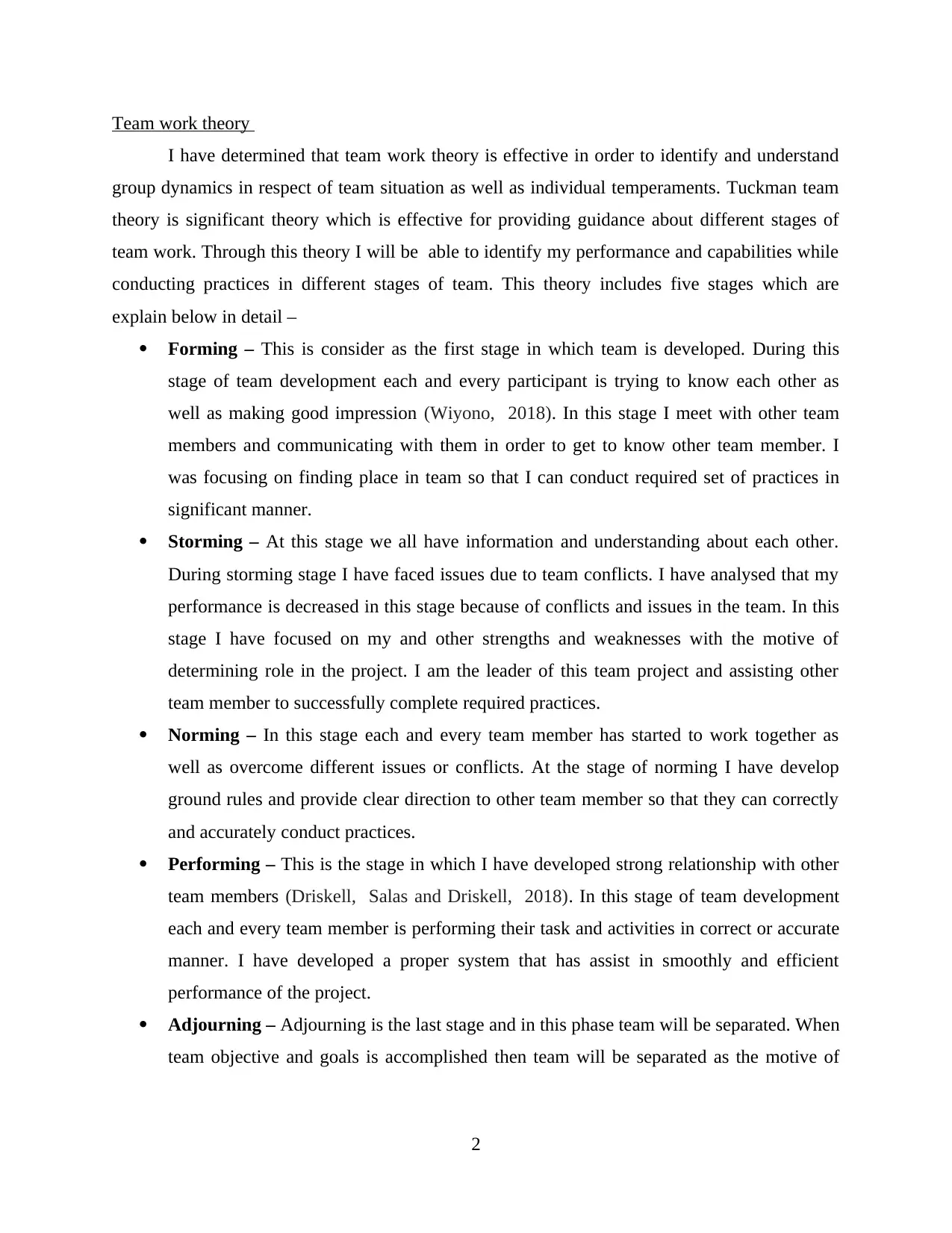
Team work theory
I have determined that team work theory is effective in order to identify and understand
group dynamics in respect of team situation as well as individual temperaments. Tuckman team
theory is significant theory which is effective for providing guidance about different stages of
team work. Through this theory I will be able to identify my performance and capabilities while
conducting practices in different stages of team. This theory includes five stages which are
explain below in detail –
Forming – This is consider as the first stage in which team is developed. During this
stage of team development each and every participant is trying to know each other as
well as making good impression (Wiyono, 2018). In this stage I meet with other team
members and communicating with them in order to get to know other team member. I
was focusing on finding place in team so that I can conduct required set of practices in
significant manner.
Storming – At this stage we all have information and understanding about each other.
During storming stage I have faced issues due to team conflicts. I have analysed that my
performance is decreased in this stage because of conflicts and issues in the team. In this
stage I have focused on my and other strengths and weaknesses with the motive of
determining role in the project. I am the leader of this team project and assisting other
team member to successfully complete required practices.
Norming – In this stage each and every team member has started to work together as
well as overcome different issues or conflicts. At the stage of norming I have develop
ground rules and provide clear direction to other team member so that they can correctly
and accurately conduct practices.
Performing – This is the stage in which I have developed strong relationship with other
team members (Driskell, Salas and Driskell, 2018). In this stage of team development
each and every team member is performing their task and activities in correct or accurate
manner. I have developed a proper system that has assist in smoothly and efficient
performance of the project.
Adjourning – Adjourning is the last stage and in this phase team will be separated. When
team objective and goals is accomplished then team will be separated as the motive of
2
I have determined that team work theory is effective in order to identify and understand
group dynamics in respect of team situation as well as individual temperaments. Tuckman team
theory is significant theory which is effective for providing guidance about different stages of
team work. Through this theory I will be able to identify my performance and capabilities while
conducting practices in different stages of team. This theory includes five stages which are
explain below in detail –
Forming – This is consider as the first stage in which team is developed. During this
stage of team development each and every participant is trying to know each other as
well as making good impression (Wiyono, 2018). In this stage I meet with other team
members and communicating with them in order to get to know other team member. I
was focusing on finding place in team so that I can conduct required set of practices in
significant manner.
Storming – At this stage we all have information and understanding about each other.
During storming stage I have faced issues due to team conflicts. I have analysed that my
performance is decreased in this stage because of conflicts and issues in the team. In this
stage I have focused on my and other strengths and weaknesses with the motive of
determining role in the project. I am the leader of this team project and assisting other
team member to successfully complete required practices.
Norming – In this stage each and every team member has started to work together as
well as overcome different issues or conflicts. At the stage of norming I have develop
ground rules and provide clear direction to other team member so that they can correctly
and accurately conduct practices.
Performing – This is the stage in which I have developed strong relationship with other
team members (Driskell, Salas and Driskell, 2018). In this stage of team development
each and every team member is performing their task and activities in correct or accurate
manner. I have developed a proper system that has assist in smoothly and efficient
performance of the project.
Adjourning – Adjourning is the last stage and in this phase team will be separated. When
team objective and goals is accomplished then team will be separated as the motive of
2
Paraphrase This Document
Need a fresh take? Get an instant paraphrase of this document with our AI Paraphraser
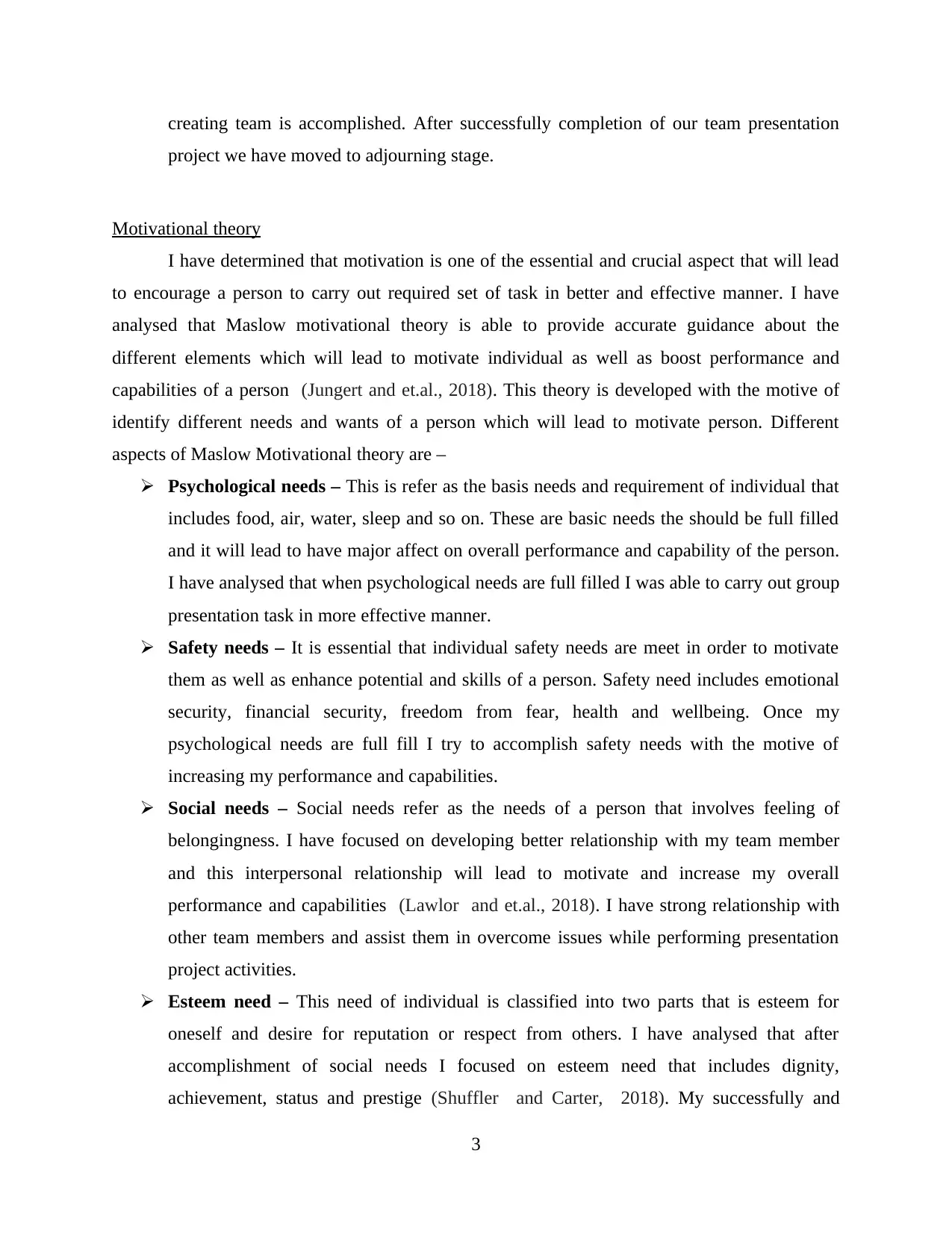
creating team is accomplished. After successfully completion of our team presentation
project we have moved to adjourning stage.
Motivational theory
I have determined that motivation is one of the essential and crucial aspect that will lead
to encourage a person to carry out required set of task in better and effective manner. I have
analysed that Maslow motivational theory is able to provide accurate guidance about the
different elements which will lead to motivate individual as well as boost performance and
capabilities of a person (Jungert and et.al., 2018). This theory is developed with the motive of
identify different needs and wants of a person which will lead to motivate person. Different
aspects of Maslow Motivational theory are –
Psychological needs – This is refer as the basis needs and requirement of individual that
includes food, air, water, sleep and so on. These are basic needs the should be full filled
and it will lead to have major affect on overall performance and capability of the person.
I have analysed that when psychological needs are full filled I was able to carry out group
presentation task in more effective manner.
Safety needs – It is essential that individual safety needs are meet in order to motivate
them as well as enhance potential and skills of a person. Safety need includes emotional
security, financial security, freedom from fear, health and wellbeing. Once my
psychological needs are full fill I try to accomplish safety needs with the motive of
increasing my performance and capabilities.
Social needs – Social needs refer as the needs of a person that involves feeling of
belongingness. I have focused on developing better relationship with my team member
and this interpersonal relationship will lead to motivate and increase my overall
performance and capabilities (Lawlor and et.al., 2018). I have strong relationship with
other team members and assist them in overcome issues while performing presentation
project activities.
Esteem need – This need of individual is classified into two parts that is esteem for
oneself and desire for reputation or respect from others. I have analysed that after
accomplishment of social needs I focused on esteem need that includes dignity,
achievement, status and prestige (Shuffler and Carter, 2018). My successfully and
3
project we have moved to adjourning stage.
Motivational theory
I have determined that motivation is one of the essential and crucial aspect that will lead
to encourage a person to carry out required set of task in better and effective manner. I have
analysed that Maslow motivational theory is able to provide accurate guidance about the
different elements which will lead to motivate individual as well as boost performance and
capabilities of a person (Jungert and et.al., 2018). This theory is developed with the motive of
identify different needs and wants of a person which will lead to motivate person. Different
aspects of Maslow Motivational theory are –
Psychological needs – This is refer as the basis needs and requirement of individual that
includes food, air, water, sleep and so on. These are basic needs the should be full filled
and it will lead to have major affect on overall performance and capability of the person.
I have analysed that when psychological needs are full filled I was able to carry out group
presentation task in more effective manner.
Safety needs – It is essential that individual safety needs are meet in order to motivate
them as well as enhance potential and skills of a person. Safety need includes emotional
security, financial security, freedom from fear, health and wellbeing. Once my
psychological needs are full fill I try to accomplish safety needs with the motive of
increasing my performance and capabilities.
Social needs – Social needs refer as the needs of a person that involves feeling of
belongingness. I have focused on developing better relationship with my team member
and this interpersonal relationship will lead to motivate and increase my overall
performance and capabilities (Lawlor and et.al., 2018). I have strong relationship with
other team members and assist them in overcome issues while performing presentation
project activities.
Esteem need – This need of individual is classified into two parts that is esteem for
oneself and desire for reputation or respect from others. I have analysed that after
accomplishment of social needs I focused on esteem need that includes dignity,
achievement, status and prestige (Shuffler and Carter, 2018). My successfully and
3
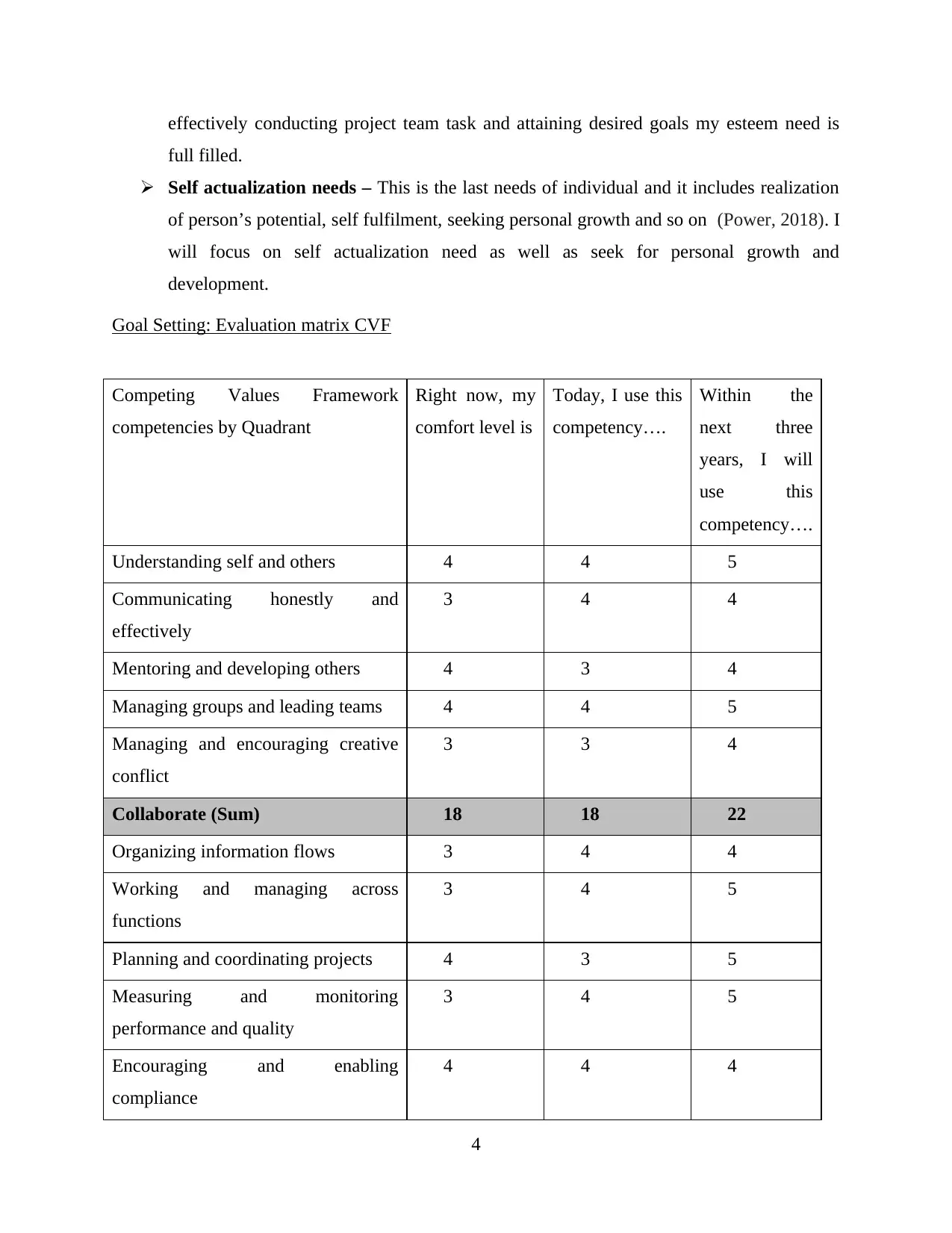
effectively conducting project team task and attaining desired goals my esteem need is
full filled.
Self actualization needs – This is the last needs of individual and it includes realization
of person’s potential, self fulfilment, seeking personal growth and so on (Power, 2018). I
will focus on self actualization need as well as seek for personal growth and
development.
Goal Setting: Evaluation matrix CVF
Competing Values Framework
competencies by Quadrant
Right now, my
comfort level is
Today, I use this
competency….
Within the
next three
years, I will
use this
competency….
Understanding self and others 4 4 5
Communicating honestly and
effectively
3 4 4
Mentoring and developing others 4 3 4
Managing groups and leading teams 4 4 5
Managing and encouraging creative
conflict
3 3 4
Collaborate (Sum) 18 18 22
Organizing information flows 3 4 4
Working and managing across
functions
3 4 5
Planning and coordinating projects 4 3 5
Measuring and monitoring
performance and quality
3 4 5
Encouraging and enabling
compliance
4 4 4
4
full filled.
Self actualization needs – This is the last needs of individual and it includes realization
of person’s potential, self fulfilment, seeking personal growth and so on (Power, 2018). I
will focus on self actualization need as well as seek for personal growth and
development.
Goal Setting: Evaluation matrix CVF
Competing Values Framework
competencies by Quadrant
Right now, my
comfort level is
Today, I use this
competency….
Within the
next three
years, I will
use this
competency….
Understanding self and others 4 4 5
Communicating honestly and
effectively
3 4 4
Mentoring and developing others 4 3 4
Managing groups and leading teams 4 4 5
Managing and encouraging creative
conflict
3 3 4
Collaborate (Sum) 18 18 22
Organizing information flows 3 4 4
Working and managing across
functions
3 4 5
Planning and coordinating projects 4 3 5
Measuring and monitoring
performance and quality
3 4 5
Encouraging and enabling
compliance
4 4 4
4
⊘ This is a preview!⊘
Do you want full access?
Subscribe today to unlock all pages.

Trusted by 1+ million students worldwide
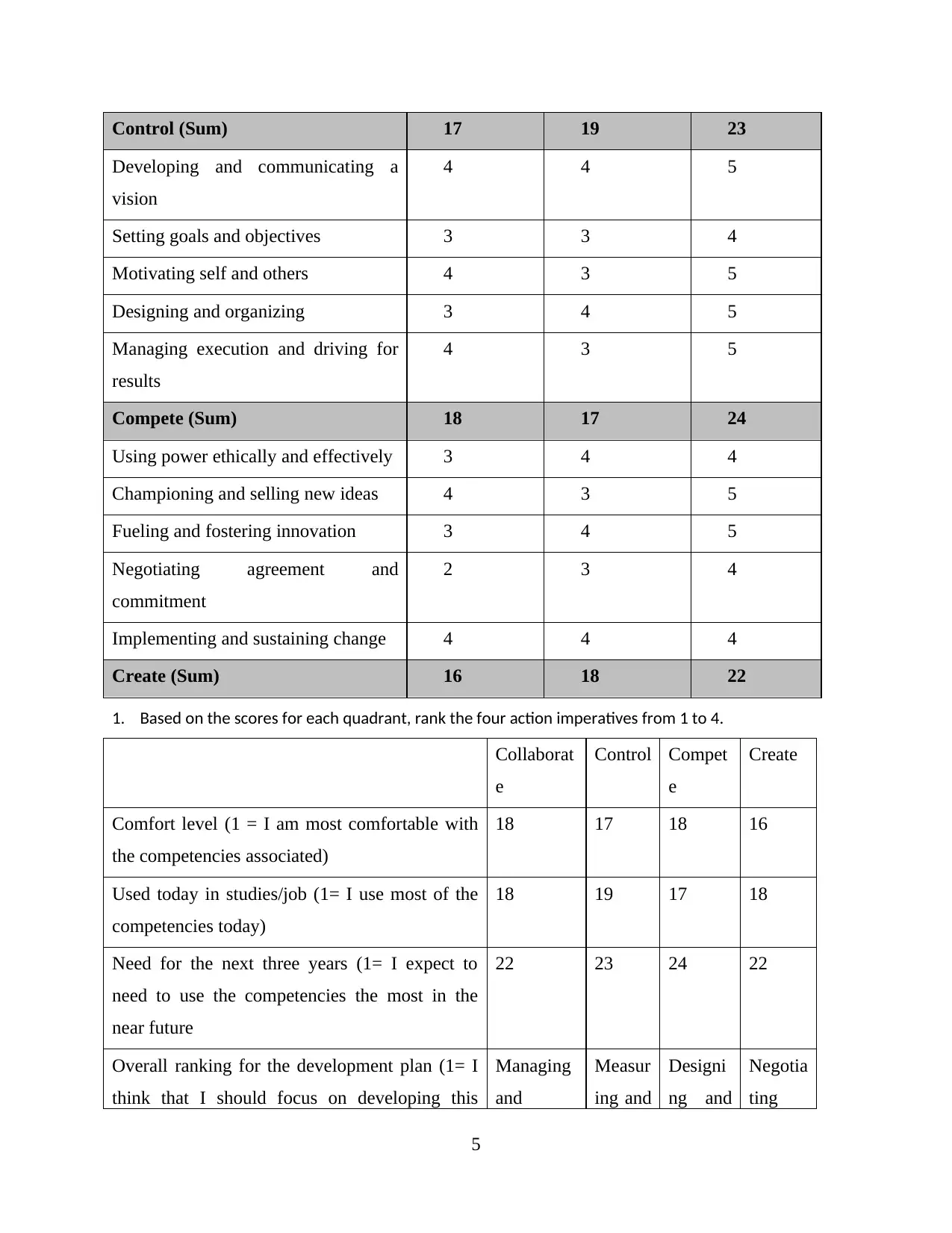
Control (Sum) 17 19 23
Developing and communicating a
vision
4 4 5
Setting goals and objectives 3 3 4
Motivating self and others 4 3 5
Designing and organizing 3 4 5
Managing execution and driving for
results
4 3 5
Compete (Sum) 18 17 24
Using power ethically and effectively 3 4 4
Championing and selling new ideas 4 3 5
Fueling and fostering innovation 3 4 5
Negotiating agreement and
commitment
2 3 4
Implementing and sustaining change 4 4 4
Create (Sum) 16 18 22
1. Based on the scores for each quadrant, rank the four action imperatives from 1 to 4.
Collaborat
e
Control Compet
e
Create
Comfort level (1 = I am most comfortable with
the competencies associated)
18 17 18 16
Used today in studies/job (1= I use most of the
competencies today)
18 19 17 18
Need for the next three years (1= I expect to
need to use the competencies the most in the
near future
22 23 24 22
Overall ranking for the development plan (1= I
think that I should focus on developing this
Managing
and
Measur
ing and
Designi
ng and
Negotia
ting
5
Developing and communicating a
vision
4 4 5
Setting goals and objectives 3 3 4
Motivating self and others 4 3 5
Designing and organizing 3 4 5
Managing execution and driving for
results
4 3 5
Compete (Sum) 18 17 24
Using power ethically and effectively 3 4 4
Championing and selling new ideas 4 3 5
Fueling and fostering innovation 3 4 5
Negotiating agreement and
commitment
2 3 4
Implementing and sustaining change 4 4 4
Create (Sum) 16 18 22
1. Based on the scores for each quadrant, rank the four action imperatives from 1 to 4.
Collaborat
e
Control Compet
e
Create
Comfort level (1 = I am most comfortable with
the competencies associated)
18 17 18 16
Used today in studies/job (1= I use most of the
competencies today)
18 19 17 18
Need for the next three years (1= I expect to
need to use the competencies the most in the
near future
22 23 24 22
Overall ranking for the development plan (1= I
think that I should focus on developing this
Managing
and
Measur
ing and
Designi
ng and
Negotia
ting
5
Paraphrase This Document
Need a fresh take? Get an instant paraphrase of this document with our AI Paraphraser
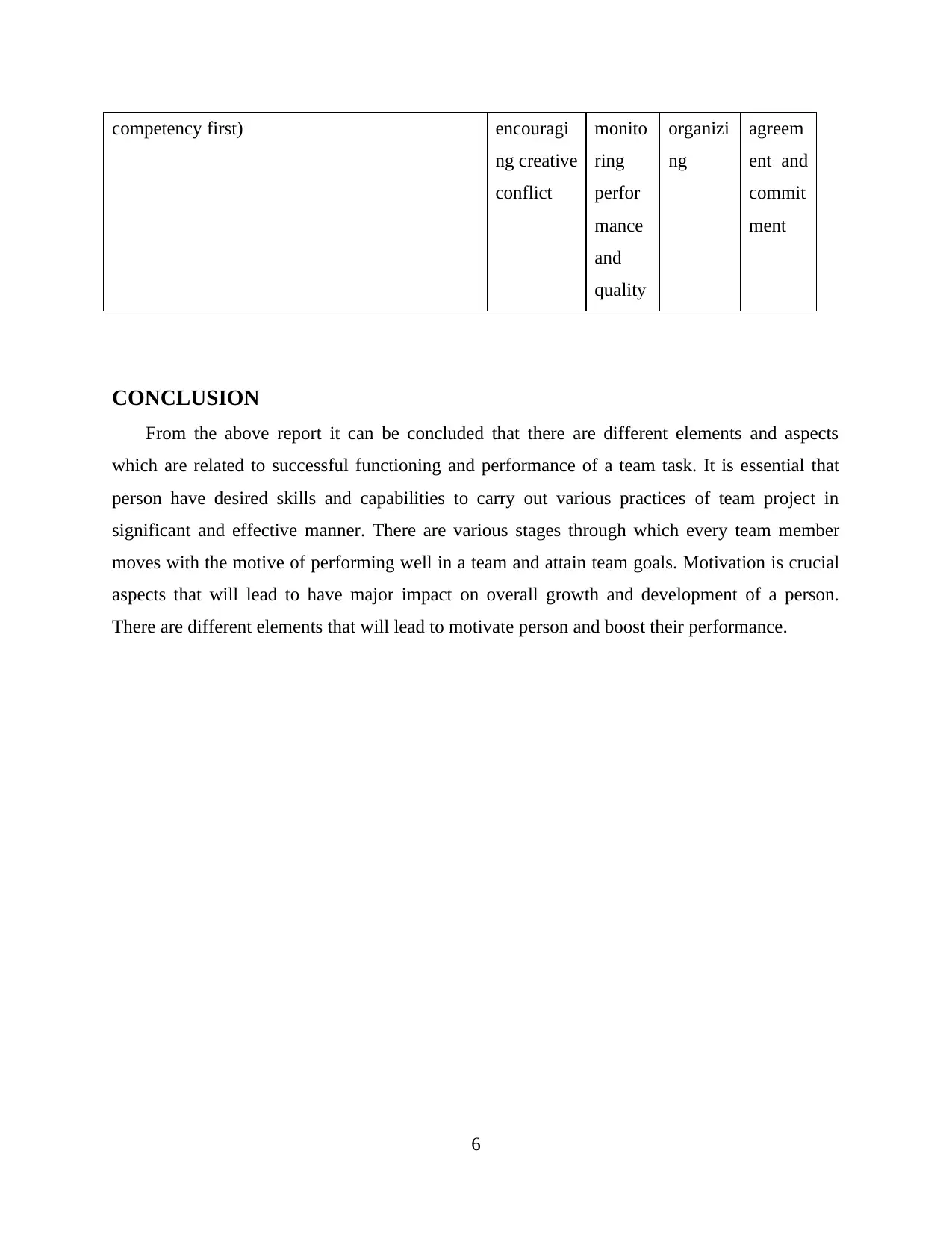
competency first) encouragi
ng creative
conflict
monito
ring
perfor
mance
and
quality
organizi
ng
agreem
ent and
commit
ment
CONCLUSION
From the above report it can be concluded that there are different elements and aspects
which are related to successful functioning and performance of a team task. It is essential that
person have desired skills and capabilities to carry out various practices of team project in
significant and effective manner. There are various stages through which every team member
moves with the motive of performing well in a team and attain team goals. Motivation is crucial
aspects that will lead to have major impact on overall growth and development of a person.
There are different elements that will lead to motivate person and boost their performance.
6
ng creative
conflict
monito
ring
perfor
mance
and
quality
organizi
ng
agreem
ent and
commit
ment
CONCLUSION
From the above report it can be concluded that there are different elements and aspects
which are related to successful functioning and performance of a team task. It is essential that
person have desired skills and capabilities to carry out various practices of team project in
significant and effective manner. There are various stages through which every team member
moves with the motive of performing well in a team and attain team goals. Motivation is crucial
aspects that will lead to have major impact on overall growth and development of a person.
There are different elements that will lead to motivate person and boost their performance.
6
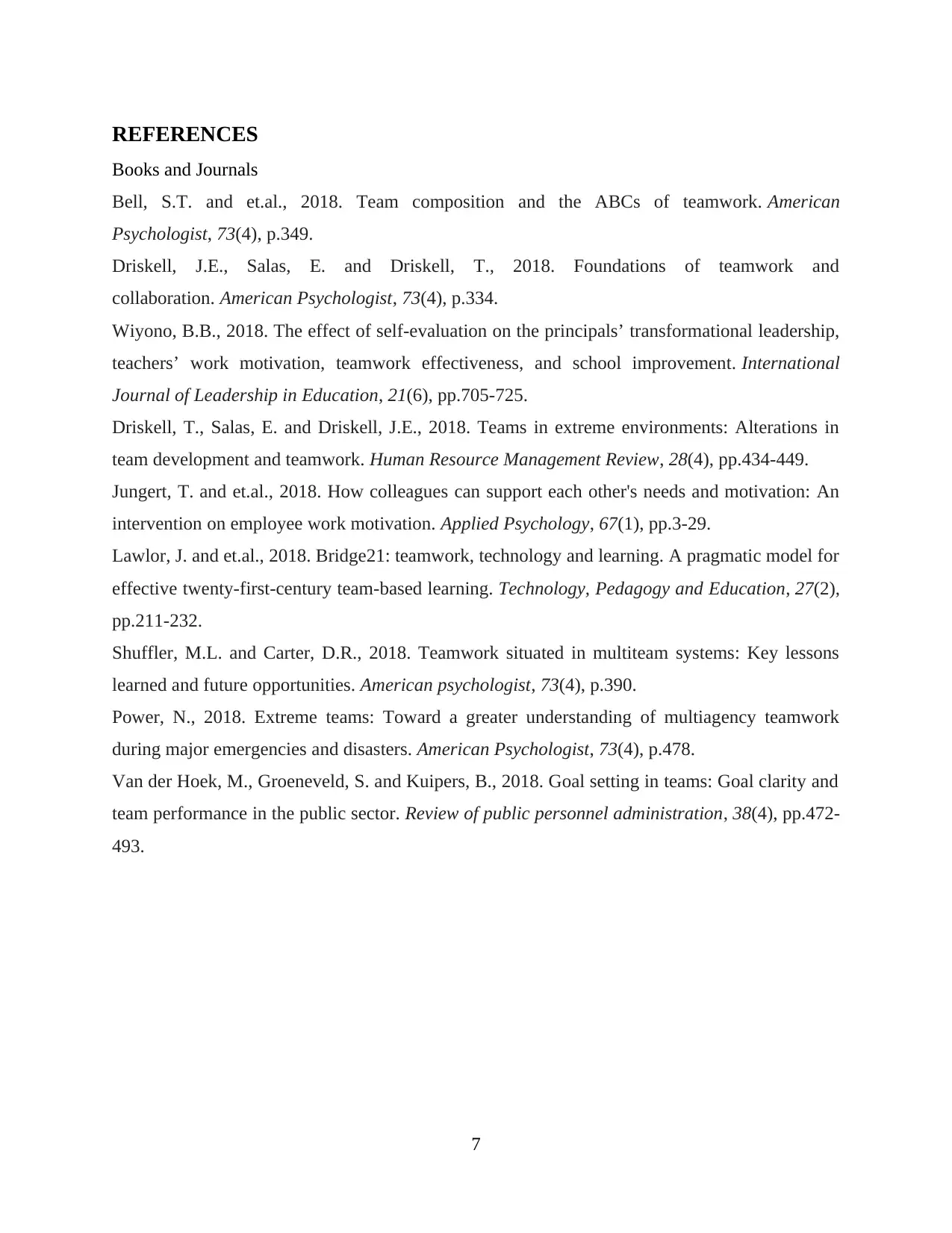
REFERENCES
Books and Journals
Bell, S.T. and et.al., 2018. Team composition and the ABCs of teamwork. American
Psychologist, 73(4), p.349.
Driskell, J.E., Salas, E. and Driskell, T., 2018. Foundations of teamwork and
collaboration. American Psychologist, 73(4), p.334.
Wiyono, B.B., 2018. The effect of self-evaluation on the principals’ transformational leadership,
teachers’ work motivation, teamwork effectiveness, and school improvement. International
Journal of Leadership in Education, 21(6), pp.705-725.
Driskell, T., Salas, E. and Driskell, J.E., 2018. Teams in extreme environments: Alterations in
team development and teamwork. Human Resource Management Review, 28(4), pp.434-449.
Jungert, T. and et.al., 2018. How colleagues can support each other's needs and motivation: An
intervention on employee work motivation. Applied Psychology, 67(1), pp.3-29.
Lawlor, J. and et.al., 2018. Bridge21: teamwork, technology and learning. A pragmatic model for
effective twenty-first-century team-based learning. Technology, Pedagogy and Education, 27(2),
pp.211-232.
Shuffler, M.L. and Carter, D.R., 2018. Teamwork situated in multiteam systems: Key lessons
learned and future opportunities. American psychologist, 73(4), p.390.
Power, N., 2018. Extreme teams: Toward a greater understanding of multiagency teamwork
during major emergencies and disasters. American Psychologist, 73(4), p.478.
Van der Hoek, M., Groeneveld, S. and Kuipers, B., 2018. Goal setting in teams: Goal clarity and
team performance in the public sector. Review of public personnel administration, 38(4), pp.472-
493.
7
Books and Journals
Bell, S.T. and et.al., 2018. Team composition and the ABCs of teamwork. American
Psychologist, 73(4), p.349.
Driskell, J.E., Salas, E. and Driskell, T., 2018. Foundations of teamwork and
collaboration. American Psychologist, 73(4), p.334.
Wiyono, B.B., 2018. The effect of self-evaluation on the principals’ transformational leadership,
teachers’ work motivation, teamwork effectiveness, and school improvement. International
Journal of Leadership in Education, 21(6), pp.705-725.
Driskell, T., Salas, E. and Driskell, J.E., 2018. Teams in extreme environments: Alterations in
team development and teamwork. Human Resource Management Review, 28(4), pp.434-449.
Jungert, T. and et.al., 2018. How colleagues can support each other's needs and motivation: An
intervention on employee work motivation. Applied Psychology, 67(1), pp.3-29.
Lawlor, J. and et.al., 2018. Bridge21: teamwork, technology and learning. A pragmatic model for
effective twenty-first-century team-based learning. Technology, Pedagogy and Education, 27(2),
pp.211-232.
Shuffler, M.L. and Carter, D.R., 2018. Teamwork situated in multiteam systems: Key lessons
learned and future opportunities. American psychologist, 73(4), p.390.
Power, N., 2018. Extreme teams: Toward a greater understanding of multiagency teamwork
during major emergencies and disasters. American Psychologist, 73(4), p.478.
Van der Hoek, M., Groeneveld, S. and Kuipers, B., 2018. Goal setting in teams: Goal clarity and
team performance in the public sector. Review of public personnel administration, 38(4), pp.472-
493.
7
⊘ This is a preview!⊘
Do you want full access?
Subscribe today to unlock all pages.

Trusted by 1+ million students worldwide
1 out of 9
Related Documents
Your All-in-One AI-Powered Toolkit for Academic Success.
+13062052269
info@desklib.com
Available 24*7 on WhatsApp / Email
![[object Object]](/_next/static/media/star-bottom.7253800d.svg)
Unlock your academic potential
Copyright © 2020–2026 A2Z Services. All Rights Reserved. Developed and managed by ZUCOL.




